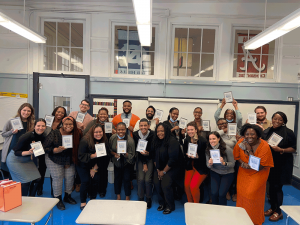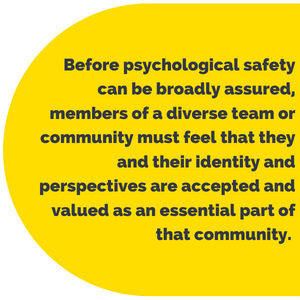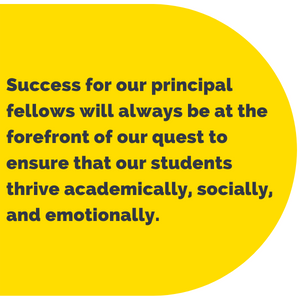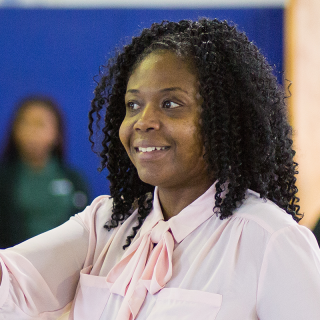Having an effective principal is a key driver of student success, teacher retention, and teacher satisfaction. Unfortunately, across the country, we’re seeing a decline in school leaders’ average number of years of experience, especially within the highest-need schools. Over the past several years, we at Uncommon have been laser-focused on cultivating a pipeline of teachers and principals of color, increasing our leaders of color by 17 percent since the 2016-2017 school year. Now, across our 53 schools, 53 percent are led by people of color. A large portion of this success is due to our principal fellowship program. When we thought about who should lead this critically important work, we turned to none other than the magnificent Jody Jones – Ryan Award winner and former principal of one of the most successful schools in New Jersey. She has created an incredibly robust program, so we asked her to share her keys to success, both from her own growth and development and from what she’s helped design for our fellows. We’re excited to share that with you all in the following blog post. —Juliana Worrell, Chief Schools Officer, K-8, Uncommon Schools

“The community felt amongst the first-year principals is truly
because of our fellowship year together with you!”
—Yvanna Saint-Fort, Principal,
Camden Prep Copewood Elementary
I recently received this note from first-year principal Yvanna Saint-Fort, and felt a profound sense of gratitude. Yvanna is a graduate of Uncommon Schools’ Beca principal, which prepares aspiring principals for a role that is as demanding as it is impactful. The Fellowship also helps us cultivate a leadership pipeline that ensures that our students, most of whom are Black or Latinx, see themselves reflected in their school leadership. One of the most important strategies we share with those emerging leaders is focused on how to build trust and rapport.
Trust and rapport foster psychological safety and confidence
We focus on building trust and rapport because they are key to the psychological safety that is vital to our Fellows’ success. But what is psychological safety, and why is it so important? Amy Edmondson, a Harvard professor and noted author on the topic, defines psychological safety as a shared belief held by members of a team that the team is safe for interpersonal risk-taking. In other words, when members of a team (or school community) feel psychologically safe, they feel empowered to ask for clarification, contribute ideas, or question established norms. That freedom to question and push leads to greater innovation and success both for individuals and for the team as a whole.
Psychological safety for school leaders, with a DEI lens
We are proud that our Principal Fellowship cultivates a pipeline of strong leaders who reflect the diversity of our school communities. Within last year’s cohort, 81 percent of our aspiring leaders identified as people of color. Psychological safety is critically important within this context because, elsewhere, members of historically marginalized groups are less likely to see themselves represented within leadership or may feel it is wiser to blend in. Before psychological safety can be broadly assured, members of a diverse team or community must feel that they and their identity and perspectives are accepted and valued as an essential part of that community. This is where diversity, inclusion, and psychological safety intersect.
blend in. Before psychological safety can be broadly assured, members of a diverse team or community must feel that they and their identity and perspectives are accepted and valued as an essential part of that community. This is where diversity, inclusion, and psychological safety intersect.
Build trust by providing clear expectations and robust support
One of the key ways in which we build trust and rapport, and engender psychological safety and confidence, is by showing our Principal Fellows that their success is important to us and we believe they are capable of achieving it. In daily practice, this translates into providing transparent and robust support — clearly outlining what is expected of Fellows, and taking the time to help them master foundational concepts and skills.
One example of how we communicate our expectations and how performance will be assessed can be found in this best-practices framework. This framework supports the host principal as they form a relationship with the Fellow, prompting both leaders to be open to receive feedback and form a genuine partnership as they learn to act as a team. We also share, upfront, the Fellowship scope and sequence, expected deliverables, professional learning plan, and approach to assessment. In addition, those assessments are aligned with the expectations that are communicated from day one. No “gotcha” moments here! Sharing clear expectations and robust support helps our Fellows:
- Achieve a level of efficacy that breeds confidence;
- Feel at ease knowing that they bring expertise to conversations with their host principals and cohort members;
- Feel empowered to share their experiences and offer suggestions for how our practices can improve; and
- Feel safe to ask questions and receive feedback that will help their own practice grow.
Miriam Maul, a Principal Fellowship alumna who now leads Uncommon’s Ocean Hill Collegiate Charter School in New York City, emphasizes the importance of psychological safety and confidence with this advice to other aspiring leaders:
“Remember that you were chosen for this opportunity because you
are capable. This doesn’t mean days won’t feel overwhelming
and stressful; it means you are being stretched and learning.
So, take full advantage, ask all of the questions and take it all in.”
—Miriam Maul, Principal,
Ocean Hill Collegiate Charter School
Foster rapport by nurturing a network of supportive relationships
The second key way we foster psychological safety is by building rapport into the Fellowship at every level. Our Fellows are known and valued in deep and meaningful ways by their host principal, by their fellow cohort members, and  by coaches like me. To help ensure that interactions between host principals and Fellows contribute to a deepening sense of rapport within these relationships, we provide host principals with templates for meetings, including this framework for a first meeting, ways to build trust and rapport and guidance for how to use each strategy.
by coaches like me. To help ensure that interactions between host principals and Fellows contribute to a deepening sense of rapport within these relationships, we provide host principals with templates for meetings, including this framework for a first meeting, ways to build trust and rapport and guidance for how to use each strategy.
Additionally, in leading the fellowship, I regularly ask fellows to reflect on their experience, specifically whether they feel respected and valued in their role, and what roadblocks they are facing in meeting their goals so that I can provide support. The goal of these reflection questions is to assess the degree to which they feel a sense of belonging, inclusion, and support.
We continue to foster that rapport in simple yet powerful ways, including providing cohort members with each others’ contact information, hosting dinners, offering office hours, sharing resources, celebrating cohort milestones, and communicating each other’s accomplishments.
In addition, the Fellowship is designed to foster trust and rapport in myriad other ways:
- Fellows practice and have check-ins in pairs, so that they are constantly invited to share what they know, as well as to learn from others.
- Fellows have opportunities to engage with current leaders with shared identities and ask questions related to their work as a principal and their identity as a leader via forums such as panel discussions.
- Fellows complete a quarterly development plan, in which they work through a number of principal tasks, while collaborating with each other, sharing resources, and navigating best practices.
Jermaine Isaac, another Fellowship alumnus who now leads Bedford Stuyvesant Collegiate Charter School, shared his take on the importance of rapport among his cohort of aspiring principals:
“We consistently pushed each other to success!
I didn’t realize how valuable it is to be able
to move at the same pace, and work as a
team for a common goal to lead.”
—Jermaine Isaac, Principal,
Colegio concertado Bedford Stuyvesant
Success for our principal fellows will always be at the forefront of our quest to ensure that our students thrive academically, socially, and emotionally. We are proud of the work of our fellows and grateful to our principals for answering the call to lead school communities.
Key learnings
- Psychological safety is vital to learning for school leaders, as well as for teachers and students
- Building trust by providing transparency in expectations and fostering rapport by nurturing a network of caring relationships
are highly effective ways to boost school leaders’ efficacy - No matter the team or group you serve, you can foster psychological safety in meaningful ways:
- Clearly define expectations and how you will assess against them
- Provide robust support to meet expectations
- Invite questioning, pushback, and innovation
- Create a variety of mentoring relationships, including peer, supervisor, and community mentoring
- School leaders who model respect and inclusion create empowered school communities where every individual’s voice matters



